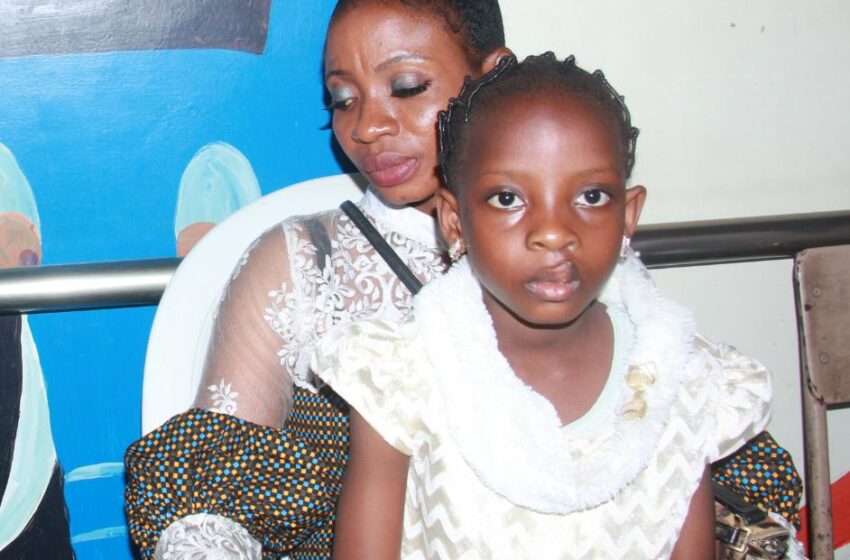Bringing back their smiles: How an NGO is giving children with clefts lifeline

It was 3:30 pm on August 30. The Lagos University Teaching Hospital (LUTH) at Idi-Araba was hustling and bustling with activities. Mrs Alice sat at a section of the hospital dedicated to patients with cleft — a birth disorder that occurs when there is an opening or split in the upper lip.
On her leg was Elizabeth, her six-year-old daughter. With teary eyes, Alice gazes at Elizabeth at intervals, relishing her transformed face.
It is a new dawn for her. Since she had Elizabeth, it has been a nightmare for her family. In a conservative country like Nigeria, where erroneous beliefs are commonplace, people with clefts face serious stigmatisation, and abuse in some cases.
Parents of such children mostly hide their kids for fear of what people would say. The affected children often withdraw from their colleagues and school over the fear of the unknown.
Alice’s joy is understandable. With support from Smile Train, the world’s largest cleft-focused organisation, her daughter got free treatment at LUTH and now she can smile again.
“I cannot express my joy,” Alice said. “When I had my daughter, I wasn’t happy about her condition. I had a lot of fears about her future. We have tried several efforts but nothing really worked until Smile Train came to my rescue. Now, my daughter goes to school and she lives a free life like every other kid,” she added.
SMILE TRAIN TO THE RESCUE
Cleft, which is common among children, occurs when certain body parts and structures do not fuse together during fetal development. Annually, it is estimated that over 200,000 babies suffer from the disorder across the globe.
The World Health Organisation (WHO) also estimates that there are over 6,280 patients with clefts in Nigeria.
While the disorder is common, many children like Elizabeth are yet to get treatment due to various factors such as poverty, limited awareness, and lack of medical resources.
In Nigeria, adjudged as one of the poorest countries in the world, for instance, many homes lack food and access to basic amenities. Due to this, several children with clefts in the country are at risk of never receiving the reconstructive surgery they need to eat, breathe, speak, hear, and often even survive childhood.
This is despite the fact that there are several children with clefts in the country.
But Smile Train is bridging the gap by creating resources to facilitate the treatment of children with clefts across the globe.
According to the organisation, “over the past 20 years, we have transformed the lives of more than 1.5 million children. With your help, we aim to double our reach in the next five years, putting more children than ever before on track to a better future
“Your gifts sustain world-class training programs that empower medical professionals in 70+ countries to treat cleft patients with life-changing, high-quality care. This is a key difference from mission-based models: Smile Train supports local medical professionals and local hospitals — it’s how we build up healthcare infrastructure around the world while providing care 365 days a year.
“Beyond surgery, our local partners also provide speech therapy, psychological support, nutritional services, orthodontics, and other essential forms of care to ensure that children with clefts have everything they need to not just live, but thrive.”
TRAINING, EMPOWERMENT… INSIDE SMILE TRAIN’S MASSIVE INVESTMENT IN GIVING CHILDREN WITH CLEFTS QUALITY LIFE
For Smile Train, ensuring quality life for children with clefts is a fight to finish. Through donations from individuals and corporate bodies, the organisation has invested massively in several countries to give children with clefts the needed support.
From empowering over 2,000 medical professionals and helping children with clefts in over 90 countries, Smile Train’s impacts are beyond words.
Prof. Mobalanle Ogunlewe, a consultant oral and maxillofacial and cleft surgeon at LUTH, is one of the medical professionals that have been trained by Smile Train to treat and promote issues around cleft in Nigeria.
Apart from medical officials, Smile Train is also creating training opportunities for media professionals to support awareness about clefts across the globe.
With the intervention of Smile Train, several children like Elizabeth who had cleft are smiling again.
Story by James Ojo





